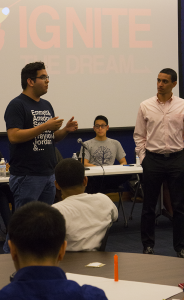
Student activists discussed their experiences on Georgetown’s campus in a Pass the Torch event Monday.
A panel of student activists reflected on their personal stories, inspirations and visions for the future of student activism in the Healey Family Student Center Monday evening.
The event, titled Pass the Torch: A Celebration of Student Activism, was the second part of the three-part Ignite the Dream: Race and Socioeconomic Class in America, an event series aimed at increasing dialogue and awareness on the topics of race, class and social inequity.
The Pass the Torch event was organized by Corey Stewart (SFS ’15), Jimmy Ramirez (COL ’15) and Bserat Ghebremicael (MSB ’17) and served both to incite dialogue among attendees as well as to inspire future leaders of student activism on Georgetown’s campus. Panelists consisted of student activists and leaders Citlalli Alvarez (COL ’15), Colleen Roberts (COL ’15), Dan Silkman (COL ’15), Esther Owolabi (COL ’15), Lydia Brown (COL ’15), Michael Le (MSB ’15) and moderator Vail Kohnert-Yount (SFS ’13).
The discussion opened with a video in support of the movement to create a Casa Latina on campus as well as a video of a spoken word performance titled “Am I Next?” conceived by LaDarius Torrey (COL ’17) and written and performed by Walter Kelly (COL ’16). The spoken word performance aimed to highlight the subjugation, racial profiling and discrimination black males continually face in modern day society.
Georgetown Scholarship Program Assistant Director Alberto Morales (COL ’12) delivered an opening statement affirming Ignite the Dream’s mission of inspiring dialogue and supporting its theme of passing the torch.
“We as seniors asked ourselves, who is going to take over and who is next,” Morales said. “That is part of why we are here tonight, to discuss how we are going to go about that and what it means.”
The event continued with discussion among the panelists, beginning with the question of how each panelist’s perception of race and socioeconomic status has changed since arriving at Georgetown.
Roberts, a Georgetown Scholarship Program Advocate and Patrick Healy Fellow, spoke about growing up attending a predominantly white school and how coming to Georgetown allowed her to realize the prevalent disparities in race and class among her fellow students.
“I always saw a difference; I always saw a disparity; I always kind of knew something was wrong,” Roberts said. “But coming to Georgetown and being an African-American studies minor really exposed me to the depth of the inequities that are ingrained in our institutions. We still are living the legacy and consequences of racism and sexism…it’s all ingrained in how we interact with each other.”
Alvarez, a Patrick Healy Fellow actively involved with Hoyas for Immigrant Rights and Undocuhoyas, expressed the difficulties that undocumented students face in higher education.
“I was very much told I was the ‘different’ Mexican, the one that is different in all of the senses,” Alvarez said. “I think you grow up believing that there was nothing wrong with that kind of marginalized racism you are around for a really long time. When I came to Georgetown, I found my racial identity.”
The panel also discussed motivations to become involved with student activism and what Georgetown’s administration could do to foster greater equality and access to benefits on campus.
Brown advocated for the creation of a disability cultural center on campus, which she has advocated for since August 2012.
“We are in a place where our university is constantly talking about innovation or designing the future, but all of the money that is going towards events, programs and initiatives that are going towards designing the future innovation really only serve to perpetuate empire and do not serve to empower the most marginalized people that are already on this campus,” Brown said.
Owolabi and Roberts both encouraged the university-wide implementation of a diversity course requirement, while Alvarez advocated for the hiring of a dedicated university employee in charge of supporting undocumented students on campus.
Silkman, chair of Students of Georgetown Inc.’s philanthropy committee, advocated for increased institutional support of access to important Georgetown traditions such as Corp Gala and the Diplomatic Ball for students who may not be able to afford the cost of such events.
Le encouraged additional collaboration between student organizations focused on social justice in order to work together to build a more equal and inclusive Georgetown community.
The event ended with a discussion on the intersectionality of student activism on campus, emphasizing how certain marginalized groups working together could affect greater change at Georgetown.
Attendee Zackary Abu-Akeel (SFS ’18) said that he appreciated the opportunity to hear the stories of upperclassman leaders of student activism and that he enjoyed the diversity of the panelists.
“The event provided an inspiring example of a wide range of activists that we have on our own campus,” Abu-Akeel said. “Each of the panelists found their own way to elevate the issue about which they were passionate to a serious and visible fight on campus, and their story sharing made it possible to relate their paths to my own.”




















